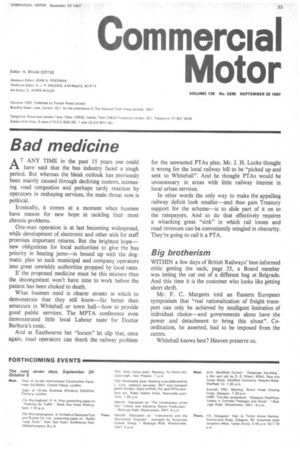Bad medicine
Page 35

If you've noticed an error in this article please click here to report it so we can fix it.
AT ANY TIME in the past 15 years one could have said that the bus industry faced a tough period. But whereas the bleak outlook has previously been mainly caused through declining custom, increasing road congestion and perhaps tardy reaction by operators in reshaping services, the main threat now is political.
Ironically, it comes at a moment when busmen have reason for new hope in tackling their most chronic problems.
One-man operation is at last becoming widespread, while development of electronic and other aids for staff promises important returns. But the brightest hope— new obligations for local authorities to give the bus priority in beating jams—is bound up with the dogmatic plan to suck municipal and company operators into great unwieldy authorities propped by local rates.
If the proposed medicine must be this mixture then the decongestant won't have time to work before the patient has been choked to death.
What busmen need is clearer streets in which to demonstrate that they still know—far better than amateurs in Whitehall or town hall—how to provide good public services. The MPTA conference even demonstrated little local Labour taste for Doctor Barbara's tonic.
And at Eastbourne her "locum" let slip that, once again, road operators can thank the railway problem for the unwanted PTAs plan. Mr. J. H. Locke thought it wrong for the local railway bill to be "picked up and sent to Whitehall". And he thought PTAs would be unnecessary in areas with little railway interest in local urban services.
In other words the only way to make the appalling railway deficit look smaller—and thus gain Treasury support for the scheme—is to slide part of it on to the ratepayers. And to do that effectively requires a whacking great "sink" in which rail losses and road revenues can be conveniently mingled in obscurity. They're going to call it a PTA.
Big broth erism
WITHIN a few days of British Railways' best-informed critic getting the sack, page 35, a Board member was letting the cat out of a different bag at Belgrade. And this time it is the customer who looks like getting short shrift.
Mr. F. C. Margetts told an Eastern European symposium that "real rationalization of freight transport can only be achieved by intelligent limitation of individual choice—and governments alone have the power and detachment to bring this about". Coordination, he asserted, had to be imposed from the centre.
Whitehall knows best? Heaven preserve us.




































































































































































